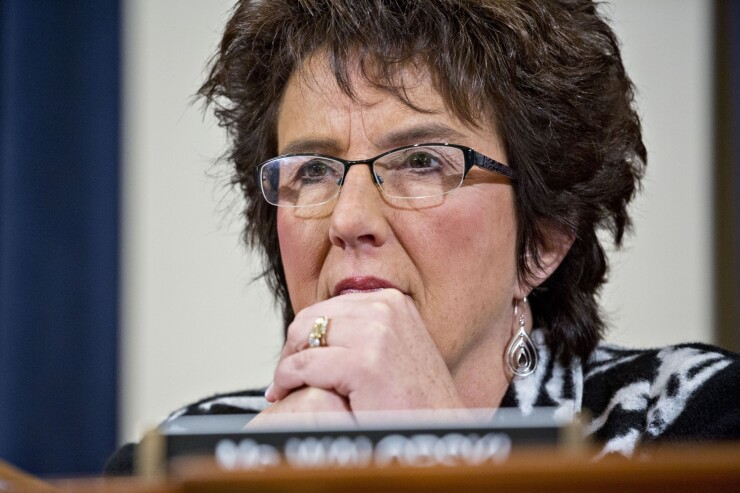Tax-exempt bond advocate Rep. Jackie Walorski of Indiana is the new Republican co-chair of the congressional Public Finance Caucus.
Walorski, a former member of the Indiana Legislature, is a co-sponsor of two bills in the current Congress to expand the use of private activity bonds in financing public buildings and affordable housing.
She succeeds former Rep. Steve Stivers, R-Ohio, who resigned from Congress May 16 to become president and CEO of the Ohio Chamber of Commerce.

Michael Decker of the Bond Dealers of America said his organization “cheers” the selection of Walorski.
“The caucus is an important bipartisan element of Congress’s oversight of public finance,” said Decker. “Rep. Walorski and her co-chair, Rep. Dutch Ruppersberger, are champions for investment and infrastructure issues, and their leadership will help propel the caucus to greater success.”
Ruppersberger, who founded the caucus in 2016 and is continuing as the Democratic co-chair, announced that he is teaming up with Walorski in a
“Jackie has worked to promote fiscal responsibility and job creation throughout her time in office, recently introducing legislation that would maximize private bond financing for multifamily housing, for example,” Ruppersberger said. “I look forward to working with her to protect the common-sense tools our communities need now.”
Walorski stated in the same press statement that she views municipal bonds as “key tools for state and local governments to leverage private dollars to build a brighter future.”
“My home state of Indiana is always on the leading edge of innovative, cost-effective ways to fund public infrastructure projects that create jobs and drive economic growth,” Walorski stated. “I’m excited to bring these common sense solutions to my work as the new co-chair of the bipartisan Municipal Finance Caucus.”
Indiana Treasurer Kelly Mitchell, president of the National Association of State Treasurers, described the caucus as “an invaluable ally to state and local governments across the country.”
Mitchell said she expects Walorski “will champion sensible federal policies –including tax-exempt municipal bonds – that support the fiscal health of state and local finance.”
Walorski is the third Republican to serve alongside Ruppersberger as co-chair.
The original Republican co-chair, former Rep. Randy Hultgren of Illinois, lost his re-election bid in 2018.
Walorski comes to the position as a key Republican on the tax-policy writing House Ways and Means Committee with a strong record of supporting tax-exempt bond financing for state and local governments.
In February Walorski signed on as an original co-sponsor of
These new PABs, which would be exempt from state volume caps, would provide an economic boost of more than $8 billion in the first year, according to a 2017 study by the Beacon Hill Institute.
Conservative taxpayer watchdog groups supported the bill in the last Congress.
“As advocates for overburdened taxpayers, we believe this innovative yet practical proposal will harness the expertise of the private sector in ensuring cost-effective construction of schools, hospitals, and other government structures,” a coalition led by the National Taxpayers Union wrote in a May 2017 letter to Congress.
The bill would expand the definition of an exempt facility bond to include public safety buildings such as firehouses in addition to hospitals, health care, laboratory, or research facilities. Also included would be a government-owned elementary or secondary school, facilities of a state college or university used for educational purposes, a public library, a courthouse or government office.
Walorski also is a co-sponsor of the bipartisan
In the last Congress, she co-sponsored with Rep. Earl Blumenauer, D-Ore., a bill to expand tax-exempt private activity bonds with the creation of
That bill, which was first proposed in the Senate in 2015, would have applied to a wide variety of projects, including airports, ports, transit, freight and passenger rail, roads, bridges, flood projects, inland and coastal waterway improvements, wastewater and sewage facilities, and broadband infrastructure. It proposed leveraging $8 billion in federal investment into $226 billion worth of bond authority over the 10 years or up to $56 billion over 10 years in tax credits, according to an estimate by the nonpartisan congressional Joint Committee on Taxation.
The Senate version of that bill was sponsored by Sens. John Hoeven, R-N.D., and Ron Wyden, D-Ore.
The bill also would have established a new federal infrastructure tax credit to encourage public-private partnerships.
The House version of the Affordable Housing Credit Improvement Act is sponsored by Walorski along with Reps. Suzan DelBene, D-Wash.; Don Beyer D-Va.; and Brad Wenstrup, R-Ohio.
The Senate sponsors are Sens. Maria Cantwell, D-Wash.; Todd Young, R-Indiana; Ron Wyden, D-Ore.; and Rob Portman, R-Ohio.
The legislation would maximize PAB financing for multifamily housing, according to the Affordable Housing Tax Credit Coalition.
Currently, more than half of a multifamily housing projects must be financed with PABs in order to qualify with the 4% federal Low Income Housing tax credit. The proposed legislation would cut the PAB minimum financing requirement in half.
“There’s a growing number of states that are using up or close to using up all of their bond volume cap,” Emily Cadik of the Affordable Housing Tax Credit Coalition said in April. “So especially in those states, this is a way to increase the amount of 4% credit that can be awarded without straining the bond cap as much.”
The volume cap has been an issue for some time in New York, California, Washington, and Massachusetts. More recently, it is an issue in Georgia and Tennessee.
Overall there are more than a dozen states that are constrained by their volume caps.
The infrastructure bill passed by the House last summer included the 25% PAB financing reduction as well as an overall increase in the state volume caps by 10%.





